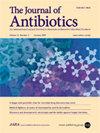In vitro and ex vivo activity of the fluoroquinolone DC-159a against mycobacteria
IF 2.1
4区 医学
Q3 BIOTECHNOLOGY & APPLIED MICROBIOLOGY
引用次数: 0
Abstract
Antimicrobial resistance is a global health problem. In 2021, it was estimated almost half a million of multidrug-resistant tuberculosis (MDR-TB) cases. Besides, non-tuberculous mycobacteria (NTM) are highly resistant to several drugs and the emergence of fluoroquinolone (FQ) resistant M. tuberculosis (Mtb) is also a global concern making treatments difficult and with variable outcome. The aim of this study was to evaluate the activity of the FQ, DC-159a, against Mtb and NTM and to explore the cross-resistance with the currently used FQs. A total of 12 pre-extensively drug-resistant (XDR) Mtb, 2 XDR, 36 fully drug susceptible strains and 41 NTM isolates were included to estimate the in vitro activity of DC-159a, moxifloxacin (MOX) and levofloxacin (LX), using minimal inhibitory and bactericidal concentration (MIC and MBC). The activity inside the human macrophages and pulmonary epithelial cells were also determined. DC-159a was active in vitro and ex vivo against mycobacteria. Besides, it was more active than MOX/LX. Moreover, no cross-resistance was evidenced between DC-159a and LX/MOX as DC-159a could inhibit Mtb and MAC strains that were already resistant to LX/MOX. DC-159a could be a possible candidate in new therapeutic regimens for MDR/ XDR-TB and mycobacterioses cases.


氟喹诺酮 DC-159a 对分枝杆菌的体外和体内活性。
抗菌药耐药性是一个全球性的健康问题。据估计,2021 年耐多药结核病(MDR-TB)病例将近 50 万。此外,非结核分枝杆菌(NTM)对多种药物高度耐药,耐氟喹诺酮(FQ)结核杆菌(Mtb)的出现也是一个全球关注的问题,这使得治疗变得困难且效果不一。本研究旨在评估氟喹诺酮类药物 DC-159a 对 Mtb 和 NTM 的活性,并探讨其与目前使用的氟喹诺酮类药物的交叉耐药性。研究共纳入了 12 株前期广泛耐药(XDR)Mtb、2 株 XDR、36 株对药物完全敏感的菌株和 41 株 NTM 分离物,采用最小抑菌浓度(MIC)和最大杀菌浓度(MBC)来评估 DC-159a、莫西沙星(MOX)和左氧氟沙星(LX)的体外活性。DC-159a 在体外和体内对分枝杆菌都有活性。此外,DC-159a 比 MOX/LX 更具活性。此外,DC-159a 和 LX/MOX 之间没有交叉耐药性,因为 DC-159a 可以抑制对 LX/MOX 已经产生耐药性的 Mtb 和 MAC 菌株。
本文章由计算机程序翻译,如有差异,请以英文原文为准。
求助全文
约1分钟内获得全文
求助全文
来源期刊

Journal of Antibiotics
医学-免疫学
CiteScore
6.60
自引率
3.00%
发文量
87
审稿时长
1 months
期刊介绍:
The Journal of Antibiotics seeks to promote research on antibiotics and related types of biologically active substances and publishes Articles, Review Articles, Brief Communication, Correspondence and other specially commissioned reports. The Journal of Antibiotics accepts papers on biochemical, chemical, microbiological and pharmacological studies. However, studies regarding human therapy do not fall under the journal’s scope. Contributions regarding recently discovered antibiotics and biologically active microbial products are particularly encouraged. Topics of particular interest within the journal''s scope include, but are not limited to, those listed below:
Discovery of new antibiotics and related types of biologically active substances
Production, isolation, characterization, structural elucidation, chemical synthesis and derivatization, biological activities, mechanisms of action, and structure-activity relationships of antibiotics and related types of biologically active substances
Biosynthesis, bioconversion, taxonomy and genetic studies on producing microorganisms, as well as improvement of production of antibiotics and related types of biologically active substances
Novel physical, chemical, biochemical, microbiological or pharmacological methods for detection, assay, determination, structural elucidation and evaluation of antibiotics and related types of biologically active substances
Newly found properties, mechanisms of action and resistance-development of antibiotics and related types of biologically active substances.
 求助内容:
求助内容: 应助结果提醒方式:
应助结果提醒方式:


